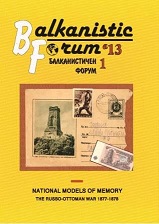Georgian Memory Culture of the Russo-Ottoman War (1877 – 1878)
Georgian Memory Culture of the Russo-Ottoman War (1877 – 1878)
Author(s): Marina Shalikava, Tamaz Phutkaradze, Marina Aroshidze, Kakhaber SurguladzeSubject(s): Cultural Essay, Political Essay, Societal Essay
Published by: ЮГОЗАПАДЕН УНИВЕРСИТЕТ »НЕОФИТ РИЛСКИ«
Summary/Abstract: The way society is building its current existence and the way it will be in the future largely depends on apprehending the past cultural experience, which is the main prerequisite of the ethnical identity. In the course of the total globalization and a problem of the national identity and in the context of the redrawing of the political map of the modern Europe, realization of the socio-humanitarian memorial paradigm, reconsideration of the own cultural memory, reconsideration of the own totalitarian past contributes to the democratization process, sustains building of the active and responsible civil society The analysis of the Georgian historiography, political newspapers, archive materials, and fiction related to the Russo-Ottoman War witness dramatic changes in the memory culture. After Ajara reunited with Georgia a long period of intensive ruin of stereotypes began: first as part of the Russian Empire, then at the time of the revolution, the Soviet and post-Soviet period. Although the material traces of the war memory are not well preserved in Georgia, the wound of Muhajirism still remains in certain families, and ‘the image of the enemy’ as reflected in the Georgian folklore and language is still in power.
Journal: Балканистичен Форум
- Issue Year: 2013
- Issue No: 1
- Page Range: 90-111
- Page Count: 22
- Language: English
- Content File-PDF

